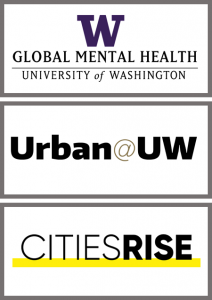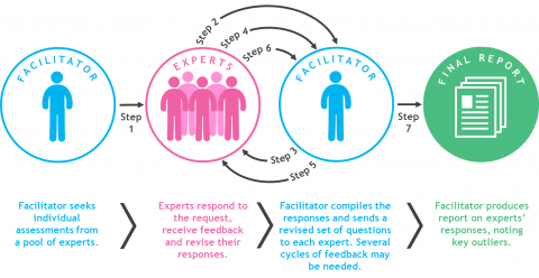Collaborative efforts
 In 2019, representatives of the University of Washington Global Mental Health Program, Urban@UW, and citiesRISE began to discuss global priorities for the mental health of young people in cities. This cross-disciplinary team
In 2019, representatives of the University of Washington Global Mental Health Program, Urban@UW, and citiesRISE began to discuss global priorities for the mental health of young people in cities. This cross-disciplinary team
What is a Delphi?
A Delphi process is a method to arrive at a group consensus around a certain question or topic area. Delphi processes typically include:
- A group of participants (known as ‘panellists’) specially selected for their particular expertise on a topic.
- Two or more sequential questionnaires known as ‘rounds’,
- Collating ideas from Round 1 to construct the survey instrument distributed in subsequent rounds,
- An evaluation phase (third or further rounds) where panellists are provided with the panel’s responses and asked to re-evaluate their original responses,
- The formation or exploration of consensus, often defined as the number of panellists agreeing with each other on questionnaire items

Source: https://research.phoenix.edu/content/research-methodology-group/delphi-method
The Urban Adolescent Mental Health Delphi
Round 1
In Round 1, Delphi panelists were asked to respond to the question “What are the characteristics of a mental health friendly city for youth?” Participants could describe up to five characteristics and were limited to a text response of 350 words. Round 1 characteristics were distilled by the administrative team, YAB, and SAB through a series of meetings into a shorter list of characteristics of a mental health friendly cities.
Round 2
In Round 2, panels selected the top 40 most important characteristics. The top 25 characteristics for youth and top 25 for non-youth were combined and further distilled by the administrative team. Members of the administrative leadership team applied the final characteristics to Bauer et al.’s socio-ecological model of health development.
Round 3
In Round 3, panel members were asked to rank characteristics within each level of the socio-ecological model in terms of a) immediacy of impact on the mental health of youth in cities, b) ability to help youth thrive in cities, or c) ease or feasibility of implementation. To arrive at the final ranked master list of characteristics of a mental health friendly city for youth, individual rankings for each characteristic were weighted by region and ordered by weighted frequency of selection in Round 2.
Delphi Leadership
- Pamela Collins, University of Washington
- Moitreyee Sinha, citiesRISE
- Thaisa Way, University of Washington
- George Patton, University of Melbourne
- Lukoye Atwoli
Scientific Advisory Board
- Nicole Bardikoff, Grand Challenges Canada
- Ines Bustamante Chavez, UPCH
- Olayinka Omigbodun, University of Ibadan
- Nathaniel Foote, True Point
- Evelyne de Leeuw, University of New South Wales
- Tarun Dua, World Health Organization
- Shisir Khanal, Teach for Nepal
- Manasi Kumar,
- Bina Lefkovitz, CitiesRISE
- Ben Danielson, Seattle Children’s Hospital
- Layla McKay, Centre for Urban Design and Mental Health
- Miguel Uribe, Pontificia Universidad Javeriana
- Jim Vollendroff, University of Washington
- Helen Herrman, University of Melbourne
Executive Committee
- Nalini Anand, Fogarty Center, National Institutes of Health
- Peter Varnum, World Economic Forum
- Ada Williams, Prince Pivotal Ventures
- Sara Wolfe, Grand Challenges Canada
- Miranda Wolpert, Wellcome Trust
- Jurgen Unutzer, University of Washington
Youth Advisory Board
- Lian Zietz
- Kelly Davis
- Chantelle Booysen
- Damian Juma
- Yvonne Ocheing
- Samuel Talaam